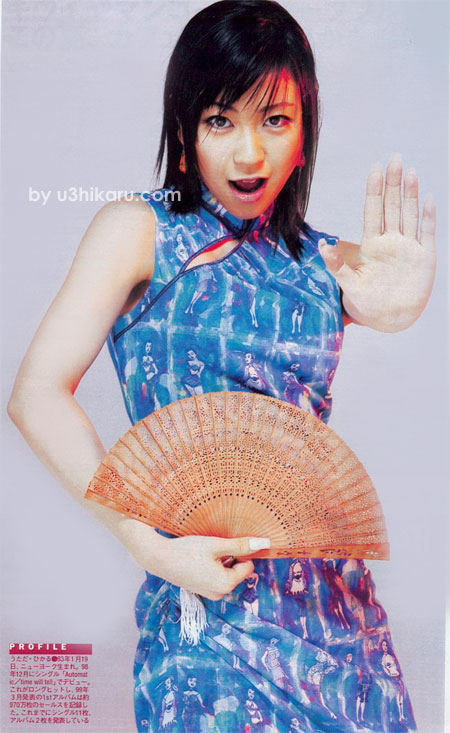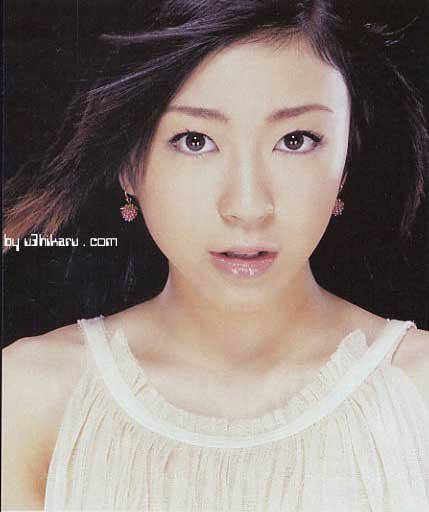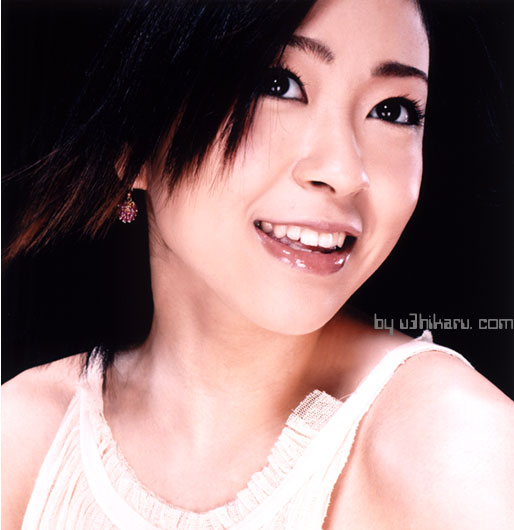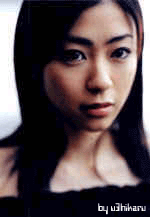English name: Hikaru Utada
Date of birth: January 19, 1983
Height: 5' 2 " / 158cm
Blood Type: A
Birth Place: New York City
Hobbies: Painting, Eating, E-mailing
This is the story of a Japanese diva. - Courtesy of http://www.f7.dion.ne.jp/~hikki/History/
Early summer in 1999, an artist accomplished the monumental work: her first album sold more than 7 million copies unprecedentedly in the history of Japanese music scene. The artist is talented not only in singing but also in writing and composing songs on her own. Surprisingly enough, she was only 16 years old.
Her name is "Hikaru Utada".
This is the story about Hikaru Utada, Hikki.
Roots
Hikaru's father is Teruzane Utada and mother is Junko (stage name Keiko Fuji).
Teruzane's father, grandfather of Hikaru, is from Yamaguchi prefecture and worked for Shochiku (a famous Japanese movie company) in New York. After that, her grandfather became an executive who issued papers for Japanese residents there. Therefore, Teruzane went to the US when he was 16 years old by his father's influence. After he graduated from university, he worked as a correspondent at a publishing company in New York. He might have experienced the Vietnam War during the career. After that, he succeeded his father's business. Then, he met Keiko Fuji and took a step forward as a music producer afterward.
Hikaru's mother, Keiko Fuji, was born in 1951 in Iwate, and grew up in Hokkaido. Her father, Souji Abe, was a singer of roukyoku (talking a story like singing, a traditional way of Japanese singing) and her mother was a player of shamisen (a traditional Japanese instrument like guitar). As her parents sang roukyoku and minyo (traditional Japanese folk songs), the family lived from hand to mouth with touring around Hokkaido and Tohoku.
Because of the surroundings, Keiko also couldn't but sing for the living. When they visited a spa in Hokkaido for their show, father became sick in bed. Then, Keiko played the part for it. At the time, her song had an appeal to a certain writer who happened to be there. He suggested to them that she should go to Tokyo to be a singer. They accepted his suggestion and got the opportunity to move to Tokyo.
However, their circumstances didn't get better because she could not get enough income to make her family's living. She had no other way besides singing for the living as ever in the entertainment and residential districts of Tokyo, like bohemian.
In September 1969, when she was 18 years old, the turning point at last came to her.
She came out with the song, titled as "Shinjyuku no onna", which became a great hit. Additionally, "Onna no blues" and "Keiko no yume wa yoru hiraku" also became great hits one after another so that she became the most popular singer in Japan. In only one year since she debut, she reached her stardom and appeared at the stage of "Kouhaku utagassen", an extremely popular TV program that is broadcast on New Year's Eve and Japanese recognize that it is very much honorable for a singer to join this program.
These two songs kept 1st and 2nd for 40 weeks at Oricon hit chart in Japan. It had never happened in the history of Japanese music scene. In this point, Keiko can be described to spend for a time goes beyond Hikaru Utada.
After ten years since then, the boom had gone out of vogue. She decided to move to New York on her own to start her new life and settled there. And then she met Teruzane. They found that they had a same taste in music, fell in love with and finally got married. In a while they had a new family.
1983. 1.19. Manhattan in New York.
Hikaru Utada was born.
Origin
Name : Hikaru Utada, named by her father, Teruzane.
Hikaru, which means "light" in Japanese, was named after its direct meaning so that she grows and lives straightforward such as light.
Nick name : Hikki
Named by friends when she lived in New York. Since it was very difficult for them to pronounce "Hikaru", they called her "Hikki", which comes from the similar pronunciation of a slang word "hickey" meaning a kiss mark.
Stage name in Japan : Utada Hikaru
(Of course on this site, we are indicating her stage name when we describe her activity "in Japan")
Awakening to music
Hikaru was born and grew up in New York, the US.
As her parents worked in the music industry, she had no choice but spend much time with them in recording studio since she was a baby. There has always been a shower of music around her. It is said that she even lodged at the studio with parents in some cases. For Hikaru, the studio was a rest and comfortable place just like her room, where she studied, played, drew and read books and comics.
She enrolled a prestigious elementary school, and besides it is well-known she had very excellent grades at the school.
She started to learn to play the piano when she was 3 years, and joined in the chorus for parents' recording since she was 6 or 7 years. Though you may find it a bit surprising, she didn't like music so much when she was a little girl. But gradually, she came to like music better and better, while she sometimes joined her parents at the studio.
The music she bought for the first time was "Little Mermaid", a song of Disney, when she was 2nd grade student. Under the influence of her father, she also often listened to rock music. Especially, she liked to listen to QUEEN, THE BEATLES, EAGLES, LED ZEPPELIN, BON JOVI and GUNS N' ROSES.
But, when she was 11 years, she was caught up in the world of R&B with the influence of her friends. Especially, "Age Ain't Nothing But A Number", one of Aaliya's songs, opened her eyes at black music ...she said in her own radio show later.
U3/cubic U/Cubic U
You must know this story when you try to understand Hikaru's roots.
It is that of her foreign activity as U3/cubic U/Cubic U. Although Hikaru Utada is now appreciated as one of the greatest artists and the ingenious diva in Heisei period, she was not free from much trouble to reach such a celebrity status . There, of course, had been twists and turns.
Hikaru started her music career by playing an active part in U3/cubic U and then released her solo CD as Cubic U in the US before she made her debut as "Utada Hikaru" in Japan.
U3
U3; Their activities are seemingly not well-known among people.
U3 is the name of a unit which Utada family formed in 1990 to do their musical activities. The main vocal is Keiko. In this unit, each of the members has stage name. Keiko is Ra U, Teruzane is Sking U and Hikaru is Ikaso U, named after a 20th century genius painter, Picasso. "U" is from initial of "Utada", and "3" is a number of the family, then they created the name "U3".
First, U3 released an album titled "U*STAR" in September 1993, when Hikaru was ten years. The illustration of the jacket was drawn by Hikaru. And the album had two songs, whose lyrics were written by Hikaru. One is "Thank You" (actually collaborated with Teruzane), and another is "Kodomotachi no uta ga kikoeru*1". You can listen to her lovely voice as a 10 years old girl in these songs.
With writing songs, basically, she learned by herself. Although she got a voice training in New York, she got the skill during one summer.
In addition, U3 released 12 inches size records from the indies label, titled as "Rainy Day" and "New Life". They contain 6 and 4 songs, respectively. However, these releases did not attract people's attention.
cubic U
2 years later, in 1995, U3 changed the name into "cubic U".
In June 1996, the unit released "Tsumetai Tsuki/Golden Era" as name of "Keiko Fuji with cubic U", the main vocal was Keiko Fuji. This song was used for the CM song of "Haku Tsuru", a well-known Japanese sake brand name. Hikaru joined in the chorus, and took turns in the vocal parts with Keiko in the coupling song.
Cubic U
In the following year, 1997, Hikaru changed her stage name to "Cubic U", to distinguish her solo activity from her family's unit "cubic U".
She made her debut in the US with the release of a maxi single "I'll be stronger" from the label of LiquidSoundLounge.
In January 1998, Cubic U released a solo debut album "Precious"; all songs were written in English from Toshiba EMI. Regrettably, though "Precious" didn't catch so much listeners' attention in Japan, the oversea reputation was such high as Lenny Kravitz and other musicians praised it.
As a result, the reputation of this work in music scene drove Hikaru Utada to appear in the world of music scene. After that, when Hikaru will be active internationally, she will step forward as Cubic U.
Debut of "Utada Hikaru"
Encounter
Teruzane felt the certain response by the praise of "Precious" in the international music scene, so he came to leave her making songs to bring out her ability.
In those days, Hikaru encountered one person who gave a turning point in her life. The person was Akira Miyake, a music producer of Toshiba EMI, who is now her producer. In 1997, "Precious" was supposed to be released for oversea prior to Japanese market. In the process of this making, she was on recording at the studio in Tokyo, at the same time Mr. Miyake happened to be in the next studio, and then he greatly attracted by her skill as a singer and looks. Mr. Miyake suggested that she should debut in Japan. Teruzane didn't reply at once because he never thought of her debut in Japan. However, Mr. Miyake did not give up his idea to let her debut in Japan and patiently continued to persuade Teruzane. His successive persuasion made Teruzane accept her debut in Japan.
Finally, in 1998, she eventually appeared in Japanese music scene.
Debut
In October 1998, Music Talks, which is a semi-annual event to introduce new singers taken place by Toshiba EMI in spring and autumn. It was held in Akasaka Blitz, where was famous for its concert hall.
Watched by number of music producers, publishers and distributors, "Utada Hikaru" appeared on the stage. Suddenly she sang "Sukiyaki", a famous song originally sung by Kyu Sakamoto and only Japanese hit song in the US music history. After she finished her singing , she introduced herself in English and, as translating it, she greeted in Japanese. A series of her performance amazed the audience. Some might have initially thought that she was a cheeky girl.
But when she sang a song that would be released soon, the atmosphere in the hall was changed largely . When they listened to her singing, none of them could veil their surprise. It was the appearance of a full-dress artist that had ability, talent and attraction they have never seen before.
This was the first event that she sang in front of many people before she came out.
About 2 months later, "Utada Hikaru" made her debut in the world of Japanese music scene with "Automatic", that can not be said to belong to any genre and has a catchy rhythm between the lyrics and the melody.
Finally her song gradually but surely caught listeners' hearts through FM-radio. . .

All images are taken from U3 Hikaru
Click on the images for larger version




